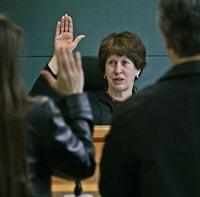|
Wednesday, April 14, 2010 - Page updated at 01:15 PM Your Courts, Their Secrets "It's a new day" as secrecy fadesSeattle Times staff reporters
In King County Superior Court, requests to seal records used to get approved casually. Often, all the parties had to do was ask. The defendant wanted to avoid embarrassment? The judge said OK. Snubbing rules established years ago, judges and court commissioners approved even the most extreme secrecy: sealing an entire file. At least 420 civil suits were sealed in their entirety since 1990, a Seattle Times investigation found. Those sealing orders kept the public from knowing about wrongdoing or alleged negligence by local schools, hospitals, lawyers, churches, state agencies, manufacturers and others. At least 266 guardianship cases were similarly sealed — restricting awareness of an obscure legal field meant to protect the vulnerable. Secrecy helped keep conflicts of interest and questionable billing practices by court-appointed guardians from public eyes. And divorce? The whole file was hidden away in at least 692 cases since 1990, eroding one of the legal system's most important checks. If the file is sealed, how can anyone know if the outcome was fair? What's to keep a judge from being unduly swayed by one side's power or legal muscle? But since The Times began reporting on improper sealing practices in March of this year, such secrecy has evaporated. A recent review of King County court records failed to turn up even one civil, guardianship or divorce case that has been sealed in its entirety in the past nine months. Instead of being hidden away, files are being opened up. Files sealed: then and now 420 civil cases 266 guardianship cases 692 divorce cases Total, 1990-2005: 1,378 Cases sealed since The Times' series began: 0 Source: Seattle Times review of state court records King County judges and commissioners have unsealed 42 cases based upon a motion or formal request by The Times. In Snohomish County, at least 150 files have been opened — with hundreds more likely to follow. Files in other counties, including Pierce, Spokane and Whatcom, have also been unsealed. Even narrow secrecy requests get scrutinized in ways unimaginable a year ago. Before, parties routinely made settlement amounts confidential. The courts typically approved, even though a settlement's terms can provide the public valuable information. Was the amount a nominal figure easily dismissed as a nuisance settlement? Or was it something more? Last year the YMCA of Greater Seattle was sued in a case with obvious public interest. A Seattle couple alleged that a teenager working in a YMCA day-care center had sexually assaulted their son and five other children. The YMCA, accused of negligent hiring and supervision, elected to settle. At a hearing last month, Court Commissioner Kimberley Prochnau was asked about the possibility of keeping the settlement's terms confidential. Prochnau said things are different now: The parties' mere desire for secrecy is no longer enough to seal any document. The settlement amount — the YMCA agreed to pay $300,000 to this one family — went into the court file, unsealed. Prochnau told the courtroom: "It's a new day." The cost of public access When it comes to open court records in Washington state, a substantial divide has separated principle from practice. The principle abhors secrecy. "Justice in all cases shall be administered openly," the Washington Constitution says. State law says court documents can be sealed only if a judge finds "compelling circumstances" — a demanding legal standard — and provides a detailed explanation for secrecy that takes into account the public interest in open records. But the practice has been to accept secrecy with little regard for legal restrictions. At least 97 percent of the sealing orders reviewed by The Times violated secrecy rules established in the 1980s. Undoing what should never have been done has proved challenging and expensive. The Times spent months identifying and sorting sealed cases across the state. Alerted by the newspaper, the clerk's office in King County opened 294 cases that had been sealed by mistake. As for the others? The judges in King County — unlike their colleagues in Snohomish and several other counties — took a vote and refused to unseal lawsuits without a formal motion. So The Times had to go to court. Davis Wright Tremaine, a law firm that specializes in public-records cases, assigned three lawyers to pursue motions for The Times: Marshall Nelson, Eric Stahl and Lissa Shook. In eight cases where Davis Wright had a conflict, motions were filed by Shelley Hall, with the law firm Stokes Lawrence. Davis Wright moved to open 32 cases. The firm put in at least 800 hours. Some cases look little time. Others took months. The lawyers' fees, on average, turned out to be about $6,000 per case. Extend that figure to all 420 of the sealed civil suits, and the cost to The Times — the cost of public access — would be a staggering $2.5 million. And that's for just one type of case, in only one county. For the newspaper, costs escalated as obstacles mounted. If possible, motions should be served on all parties to a case. So The Times tried to find plaintiffs and defendants — even though the files were sealed, with crucial identifying details unavailable to the newspaper. We tried, to no avail, to serve one woman with the last name Roe — a frequent pseudonym in legal matters, akin to Doe. But how do you serve someone when you're unsure of her real name? Other names were common and offered not even a middle initial. How do you serve someone when dozens of people have the same name? Other parties were easy to identify but hard to find. One process server in Wyoming tried to locate a dentist who had apparently retired there. A separate process server went 10 times to a Seattle address listed for the dentist. We never did manage to hand him our motion, but a judge eventually opened the file anyway. Some parties raised objections that bordered on the absurd — but we had to respond, nonetheless. One woman asked to have her name stripped out of every document in the lawsuit, even though she was a named defendant. A commissioner refused. Other cases required us to rebut arguments based on what was in the file — even though we couldn't see the file for ourselves. Files unsealed, secrets revealed So far we've filed 40 motions to unseal cases in King County. Thirty-six were granted and two denied. The two others are pending. In addition, six other cases were opened in King County by a handful of judges willing to act without a formal motion. The unsealed lawsuits have revealed stories such as these: • A lawsuit filed three years ago disclosed how a 13-year-old girl came to be raped while in the state's care. Her story showed bureaucratic bungling by the state's social-services agency; unheeded warnings by YouthCare, a group-home operator; and audacity by state lawyers, who claimed the victim was partly at fault for being raped by a 29-year-old youth worker. A judge had sealed this lawsuit upon a motion that said the file's contents could embarrass YouthCare and the state. • Five years ago, the Northshore School District settled a legal claim that accused four principals of ignoring repeated warnings that an elementary-school teacher was fondling students. But a secrecy agreement forbade the young victims from saying anything bad about the teacher or district — and even restricted what they could tell any therapist. After The Times wrote about this case, the Issaquah School District began investigating one of the principals, Ed Young. He resigned two weeks later as principal of Skyline High School. • When state health-care regulators settled disciplinary charges against Dr. James H. Greene earlier this year — handing out their lightest punishment — they didn't know about a malpractice lawsuit that accused him of not bothering to examine a pregnant woman deep in labor. The delivery later went awry, and the baby suffered devastating injuries. Greene's employer, Group Health Cooperative, settled the lawsuit for $5.5 million, but the entire file was sealed. The case shows up in a database used by lawyers, but as Confidential v. Confidential, in county Confidential. • The family of a diabetic woman who suffered permanent brain damage accused Medtronic Inc., a manufacturer, of selling an unsafe insulin pump and the University of Washington Medical Center of medical malpractice. The file was sealed in 2003, concealing concerns about the pump and how Medtronic had not reported the case to federal regulators. The UW, a public entity, settled its part of the lawsuit for $3.2 million — but on condition the plaintiffs not tell anyone, including the media, how much the university paid or why. Other unsealed lawsuits have also proved valuable. One accused a judge of committing legal malpractice in one of the last cases he tried before joining the bench. Another accused a respiratory therapist of using a wrong adapter — so that oxygen was forced into a newborn, with no way out. That lawsuit was settled for $7.8 million, described as a record for birth-injury cases in Washington. But some files have been opened under conditions that make it hard to tell what really happened. Three years ago, a Boeing manager sued the company, alleging another manager had "sexually assaulted" her in a hotel room during a business trip. The alleged assailant — once the woman's supervisor — had previously said he "wanted her" and told her how his high-level Boeing friends cheated on their wives, the complaint says. When the woman reported the alleged assault to Boeing, "she was told by Boeing personnel that she had to leave town for two weeks," the lawsuit says. Boeing isolated and punished her, the complaint alleges. This file was sealed in 2004 and reopened this year. But the identities of the alleged assailant and other Boeing officials involved in the case have been blacked out. Although the court file refers to the plaintiff only by her initials, she feared being identified if other information was revealed. So she asked to have all kinds of details — titles, places, dates, names — marked out if the file was unsealed. The Times argued that this would "have the perverse effect of shielding those who wronged her." But Judge James Doerty granted the woman's request. Tim Neale, a Boeing spokesman, said: "When this occurred the company launched an investigation, and eventually all matters were resolved to the satisfaction of both parties. And the person who was accused by [the plaintiff] no longer works for Boeing. He left the company on June 1, 2003." A suspended sheriff's deputy, a disbarred lawyer The two Times motions that were denied had been filed to learn more about people who hold positions of public trust or were professionally licensed. Three years ago, the David Brame case illustrated the importance of open records concerning police officers. In April 2003, Brame, the Tacoma police chief, shot his wife, then himself. Subsequent news stories revealed that Brame had once been accused of rape — but the details had been sealed in an employment-discrimination lawsuit. Three months after this murder-suicide, Doerty, the King County judge, sealed a domestic-violence petition against a Snohomish County sheriff's deputy. The file contained "inappropriately explicit, lurid descriptions of private sexual behavior between the parties," Doerty's order said. Instead of blacking out whatever passages he deemed objectionable, Doerty sealed everything. He also refused to open the file this year. Through a public-disclosure request, the Times obtained the records of an internal sheriff's investigation conducted after the deputy's wife filed her petition. That file shows the deputy was suspended without pay in 2004 after he admitted being physically abusive to his wife. The other Times motion that was denied concerned a lawsuit filed in 2000 against Adina Atwood, a lawyer in Kent. The state disbarred Atwood in 2004, finding she had abandoned her practice without letting her clients know. She even kept money owed to some clients, the bar found. Judge Richard McDermott's order sealing the 2000 lawsuit failed to meet the legal requirements for secrecy, saying simply: "This file is hereby ordered sealed." His refusal this year to open the file was similarly cryptic. McDermott's order said secrecy was needed to protect "the physical well being of one or both of the parties." Changes in state and federal courts Since The Times began reporting on improperly sealed court records, state and federal courts have adopted a number of changes. This year the Washington Supreme Court amended its rules, saying, among other things, that the parties' wish for secrecy does not, by itself, justify sealing. The U.S. District Court for the Western District of Washington also tightened its rules, saying lawyers can no longer file pleadings under seal without first getting permission from a judge. In King County, judges and commissioners now receive extensive training on sealing restrictions. The judges threw out an old sealing form that misstated the law on secrecy, and took the power to seal away from substitute commissioners. In Snohomish County, judges initiated an exhaustive review of more than 1,000 sealed cases. They've opened at least 150 so far and are reviewing dozens more each month. The Times plans to keep writing about sealed cases. Look for more stories in the months to come. Ken Armstrong: 206-464-3730 or karmstrong@seattletimes.com; Justin Mayo: 206-464-3669 or jmayo@seattletimes.com; Steve Miletich: 206-464-3302 or smiletich@seattletimes.com. Copyright © 2006 The Seattle Times Company |
Seattle Times Special
Miracle Machines: The 21st-Century Snake Oil
The Favor Factory
Confronting Malaria
Pike Place Market
Your Courts, Their Secrets
License to Harm
The Bering Sea
Olympic Sculpture Park |













